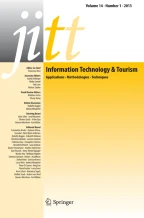Abstract
User generated content in general and textual reviews in particular constitute a vast source of information for the decision making of tourists and management and are therefore a key component for e-tourism. This paper provides a description of the topic model method with a particular application focus on the tourism domain. It therefore contributes different application scenarios where the topic model method processes textual reviews in order to provide decision support and recommendations to online tourists as well as to build a basis for further analytics. In the latter case the delivery of additional semantics helps digging into the enormous amounts of data that are continuously collected in present time. The contribution therefore consists of new models based on the topic model method and results from experimenting with user generated review data on restaurants and hotels.
Similar content being viewed by others
References
Agarwal D, Chen BC (2010). flda: matrix factorization through latent dirichlet allocation. In: Proceedings of the third ACM international conference on web search and data mining, pp 91–100
Aletras N, Stevenson M (2014) Labelling topics using unsupervised graph-based methods. In: Proceedings of the association for computational linguistics, pp 631–636
Blei D, Lafferty J (2006a) Correlated topic models. Adv Neural Info Process Syst 18:147
Blei DM (2012) Probabilistic topic models. Commun ACM 55(4):77–84
Blei DM, Lafferty JD (2006b). Dynamic topic models. In: Proceedings of the 23rd international conference on machine learning, pp 113–120
Blei DM, Ng AY, Jordan MI (2003) Latent dirichlet allocation. J Mach Learn Res 3:993–1022
Chang J, Blei DM (2009) Relational topic models for document networks. In: International conference on artificial intelligence and statistics, pp 81–88
Deerwester SC, Dumais ST, Landauer TK, Furnas GW, Harshman RA (1990) Indexing by latent semantic analysis. JASIS 41(6):391–407
Dippelreiter B, Grün C, Pöttler M, Seidel I, Berger H, Dittenbach M, Pesenhofer A (2008) Online tourism communities on the path to web 2.0: an evaluation. Info Technol Tour 10(4):329–353
Gretzel U, Yoo KH (2008) Use and impact of online travel reviews. In: Information and communication technologies in tourism 2008 (ENTER). Springer, Heidelberg, pp 35–46
Herlocker JL, Konstan JA, Borchers A, Riedl J (1999) An algorithmic framework for performing collaborative filtering. In: Proceedings of the 22nd annual international ACM SIGIR conference on research and development in information retrieval, pp 230–237
Hofmann T (1999) Probabilistic latent semantic indexing. In: Proceedings of the 22nd annual international ACM SIGIR conference on research and development in information retrieval, pp 50–57
Jannach D, Zanker M, Fuchs M (2014) Leveraging multi-criteria customer feedback for satisfaction analysis and improved recommendations. Inf Technol Tour 14(2):119–149
Lau JH, Grieser K, Newman D, Baldwin T (2011). Automatic labelling of topic models. In: Proceedings of the 49th annual meeting of the association for computational linguistics: human language technologies, vol 1, pp 1536–1545
Lin C, He Y, Everson R, Rüger S (2012) Weakly supervised joint sentiment-topic detection from text. IEEE Trans Knowl Data Eng 24:1134–1145
Litvin SW, Goldsmith RE, Pan B (2008) Electronic word-of-mouth in hospitality and tourism management. Tour Manag 29(3):458–468
Magatti D, Calegari S, Ciucci D, Stella F (2009) Automatic labeling of topics. In: Intelligent systems design and applications, 2009. ISDA’09. Ninth international conference on, pp 1227–1232
Manning CD, Raghavan P, Schütze H (2008) Introduction to information retrieval. Cambridge University Press, New York
McAuley J, Leskovec J (2013) Hidden factors and hidden topics: understanding rating dimensions with review text. In: Proceedings of the 7th ACM conference on recommender systems, pp 165–172
Mcauliffe JD, Blei DM (2008) Supervised topic models. In: Advances in neural information processing systems, pp 121–128
Mnih A, Salakhutdinov R (2007) Probabilistic matrix factorization. In: Advances in neural information processing systems, pp 1257–1264
Pang B, Lee L (2008) Opinion mining and sentiment analysis. Found Trends Inf Retr 2(1–2):1–135
Rossetti M, Stella F, Cao L, Zanker M (2015) Analyzing user reviews in tourism with topic models. In: Information and communication technologies in tourism 2015 (ENTER). Springer, Heidelberg, pp 47–58
Sarwar B, Karypis G, Konstan J, Riedl J (2001) Item-based collaborative filtering recommendation algorithms. In: Proceedings of the 10th international conference on World Wide Web, pp 285–295
Schmallegger D, Carson D (2008) Blogs in tourism: changing approaches to information exchange. J Vacat Mark 14(2):99–110
Wang C, Blei DM (2011) Collaborative topic modeling for recommending scientific articles. In: Proceedings of the 17th ACM SIGKDD international conference on knowledge discovery and data mining, pp 448–456
Wang H, Lu Y, Zhai C (2010) Latent aspect rating analysis on review text data: a rating regression approach. In: Proceedings of the 16th ACM SIGKDD international conference on knowledge discovery and data mining, pp 783–792
Xiang Z, Gretzel U (2010) Role of social media in online travel information search. Tour Manag 31(2):179–188
Xiang Z, Gretzel U, Fesenmaier DR (2009) Semantic representation of tourism on the internet. J Travel Res 47(4):440–453
Ye Q, Law R, Gu B, Chen W (2011) The influence of user-generated content on traveler behavior: an empirical investigation on the effects of e-word-of-mouth to hotel online bookings. Comput Human Behav 27(2):634–639
Yoo K-H, Gretzel U (2009) What motivates consumers to write online travel reviews? Inform Technol Tour 10(4):283–295
Yoo KH, Lee Y, Gretzel U, Fesenmaier DR (2009) Trust in travel-related consumer generated media. In: Information and communication technologies in tourism 2009 (ENTER). Springer, New York, pp 49–59
Zehrer A, Crotts JC, Magnini VP (2011) The perceived usefulness of blog postings: an extension of the expectancy-disconfirmation paradigm. Tour Manag 32(1):106–113
Acknowledgments
Authors acknowledge the financial support from the European Union (EU), the European Regional Development Fund (ERDF), the Austrian Federal Government and the State of Carinthia in the Interreg IV Italien-Österreich programme (project acronym O-STAR).
Author information
Authors and Affiliations
Corresponding author
Additional information
This article is an extended version of the following paper published at ENTER’15 (Rossetti et al. 2015).
Rights and permissions
About this article
Cite this article
Rossetti, M., Stella, F. & Zanker, M. Analyzing user reviews in tourism with topic models. Inf Technol Tourism 16, 5–21 (2016). https://doi.org/10.1007/s40558-015-0035-y
Received:
Revised:
Accepted:
Published:
Issue Date:
DOI: https://doi.org/10.1007/s40558-015-0035-y
